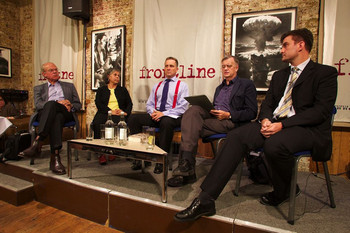Picture: Chris King

By Sara Elizabeth Williams
As the last full US combat brigade rumbled out of Iraq, what comes next for the region and its people, and what is the legacy of this long and divisive conflict?
A Frontline Club panel got together to discuss just that on Wednesday night, discussing Iraq's recovery and reconciliation and some of the the darker episodes from the war.
If you couldn't be with us for this event, you can watch the whole thing here:
Chair Tim Lambon read a particularly harrowing section of panelist Jim Frederick’s book Black Hearts, in which four US soldiers -- neglected, unsupervised and pushed to the brink -- plan a rape and multiple murder.
Frederick’s book documents a serious breakdown in leadership, something fellow panelist Sir Hillary Synnott acknowledged as the very bedrock of the military, an institution that tends to attract broken young men seeking father figures:
Soldiers need to be led actively, and if that father is himself broken, then the system breaks down. The officer corps must be maintained, placing a great deal of emphasis on integrity.
The incident offers lessons for military leadership, but panel members looked beyond these to identify next steps for the region and for the international community.
For John Sloboda, co-founder of the Iraq Body Count Project, the central problem is one of context -- that the stories of this war are being told from the wrong perspective. "This war isn’t an American tragedy or a British tragedy but an Iraqi tragedy," he said.
Both Sloboda and Iraqi author Haifa Zangana attested that the attention paid to Iraqi casualties had been pitiful. For Zangana, this wasn’t new: "The blackout on Iraqi voices has been there since the beginning," she said.
The panel broadly agreed that something needed to be done to bridge the gap between all sides and to enable Iraqis to move past the scenes described in Frederick’s book. Sloboda cited the census conducted after the Bosnian war as a successful and necessary step towards reconciliation in a post-war country:
Every civilian victim of this war and all wars, wherever they are in the world, deserved to be properly memorialised.
Lambon referred to the Iraq war as "the forgotten war" and some commentators (see this in the American Journalism Review) have questioned how such a huge event as the end of the war hasn't been much noticed by the press or public..
Zangana warned that Iraqi youths were becoming powerfully anti-West -- "Moderate, sensible people are disappearing," she warned -- while Sir Hilary referred to the Pashtun obligation to avenge one death with another. "And what have we been doing? Killing civilians".
Yet perhaps, in the end, the withdrawal will be a case of handing reconstruction over to the people still standing. Frederick was pragmatic:
Unless there is a dramatic increase in violence, I don’t think that the American public will pay much attention to Iraq from [now on]... Iraq has much hard work ahead of it and a lot of that work is going to be done by Iraqis.
Here's the Twitter stream from last night's event: